Tunisia national football team
| Nickname(s) |
نسور قرطاج (Eagles of Carthage) | ||
|---|---|---|---|
| Association | Tunisian Football Federation | ||
| Confederation | CAF (Africa) | ||
| Sub-confederation | UNAF (North Africa) | ||
| Head coach | Faouzi Benzarti | ||
| Captain | Aymen Mathlouthi | ||
| Most caps | Sadok Sassi (116) | ||
| Top scorer | Issam Jemâa (36) | ||
| Home stadium | Stade Olympique de Radès | ||
| FIFA code | TUN | ||
| |||
| FIFA ranking | |||
| Current |
23 | ||
| Highest | 14 (April 2018) | ||
| Lowest | 65 (July 2010) | ||
| Elo ranking | |||
| Current |
47 | ||
| Highest | 24 (June 1978) | ||
| Lowest | 103 (July 1988) | ||
| First international | |||
|
(Tunisia; 25 June 1957) | |||
| Biggest win | |||
|
(Rome, Italy; 18 August 1960) (Tunis, Tunisia; 7 January 2000) (Tunis, Tunisia; 26 March 2005) (Radès, Tunisia; 12 June 2015) | |||
| Biggest defeat | |||
|
(Budapest, Hungary; 24 July 1960) | |||
| World Cup | |||
| Appearances | 5 (first in 1978) | ||
| Best result | 9th (Group stage) (1978) | ||
| Africa Cup of Nations | |||
| Appearances | 18 (first in 1962) | ||
| Best result | Champions (2004) | ||
| Confederations Cup | |||
| Appearances | 1 (first in 2005) | ||
| Best result | Group stage (2005) | ||
The Tunisia national football team (Arabic: منتخب تونس لكرة القدم), nicknamed Les Aigles de Carthage (The Eagles of Carthage or The Carthage Eagles), is the national team of Tunisia and is controlled by the Tunisian Football Federation. They have qualified for five FIFA World Cups, the first one in 1978, but have yet to make it out of the first round. Nevertheless, they created history in that 1978 tournament in Argentina by becoming the first African side to win a World Cup match, beating Mexico 3–1. They also held defending champions West Germany to a goalless draw before bowing out. They have since qualified for three tournaments in succession, in 1998, 2002, 2006, as well as the 2018 finals.
Tunisia also won the 2004 Africa Cup of Nations, as tournament hosts.
History
Beginning (1928–1956)
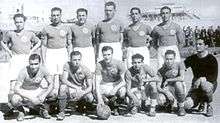
Before independence, an unofficial team was formed in 1928, comprising the best Tunisian players from the Tunisian League. The team's first match was on 11 March 1928, against the France national football B team; Tunisia lost 8-2. Their next friendlies, against the same team on 23 March 1930 and 26 March 1933, also resulted in heavy defeats: 0-5 and 1-6 respectively. Tunisia had to wait until 1939 for their first match win: a 4-1 victory over a team of amateur footballers of Paris.
The most capped players of this period are :
- Gustave Ducousso (Olympique Béja): 22 caps
- Gaetano Chiarenza (CS Hammam-Lif): 21 caps
- Azzopardi (Olympique Béja): 19 caps
- Larbi Ben Hassine -Larbi Bardo- (Espérance de Tunis): 16 caps
- Rachid Sehili (Étoile du Sahel): 16 caps
- Mehl (Racing Club): 15 caps
- Laâroussi Tsouri (Espérance de Tunis): 15 caps
- Ben Moussa (US Tunis): 15 caps
- Alaya Douik (Étoile du Sahel): 14 caps
- Dara (Sporting Club Tunis): 11 caps.
Post independence (1957–1962)
Tunisia gained independence from France on 20 March 1956. The Tunisian Football Federation was founded on 29 March 1957 and became affiliated to FIFA and the Confederation of African Football in 1960. The independent Tunisia played their first match against Algeria on 1 June 1957, in the midst of the Algerian War; Tunisia lost 2-1.They played their first official match at the 1957 Pan Arab Games where they won the silver medal. Tunisia qualified for 1960 Summer Olympics which was their first international event; on 24 July 1960, the team experienced its biggest-ever defeat, losing 10-1 against Hungary. However, less than a month later, on 18 August 1960, Tunisia recorded their biggest-ever win: an 8-1 thumping of Taiwan.
Golden generation (1962–1978)
In 1962, Tunisia entered the African Cup of Nations qualifiers for the first time: the team successfully qualified for the tournament and went on to finish third. Three years later, Tunisia hosted the 1965 African Cup of Nations and reached the final, where they lost 3-2 to Ghana in extra-time. Despite this early success, Tunisia did not enter the Cup of Nations again until 1976, and did not qualify for one until 1978. In 1973, however, the team entered the Palestine Cup of Nations and won in dominant fashion, winning all six of their matches, scoring 19 goals, and conceding only three.
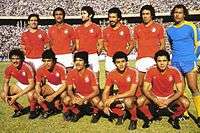
In 1977, under new coach Abdelmajid Chetali, Tunisia qualified for the 1978 African Cup of Nations and, at the same time, their first-ever World Cup. Tunisia made the semi-finals at the Cup of Nations, beating holders Morocco along the way, but lost to Ghana in the semi-finals. In the third-place match against Nigeria, Tunisia initially took the lead, but when Nigeria scored a controversial equalizer in the 42nd minute, the Tunisians walked off the pitch in protest and Nigeria were awarded a 2-0 victory by default.
At the World Cup in Argentina, Tunisia made an immediate impact by coming from behind to beat Mexico 3-1, becoming the first African team to win a World Cup finals match. A few days later, the team held reigning champions West Germany to a 0-0 draw. Despite these impressive results, however, a 0-1 defeat to Poland in their final group match meant they were eliminated in the group stages.
Decline (1978–1994)
Following their first experience of World Cup football, Tunisia experienced a sudden decline. Between 1980 and 1992, the team managed to qualify for only two tournaments - the 1982 African Cup of Nations and the 1988 Summer Olympics - and in both they were knocked out in the first round. Tunisia managed to break the streak in 1994, qualifying for that year's African Cup of Nations, but were eliminated in the first round yet again, finishing bottom of a group containing the likes of Mali and Zaire.
Beginning of Resurgence (1994–2002)
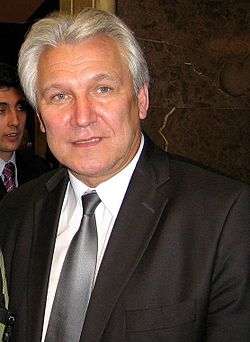
After the team's poor performance at the 1994 African Cup of Nations, a new coach was appointed: Henryk Kasperczak. Under him, Tunisia qualified for 1996 African Cup of Nations and finished second in their group, putting them through to the quarter-finals. Tunisia went on to beat Gabon in the quarter-finals and Zambia in the semi-finals to reach their first major final in 31 years, but lost to host country South Africa 2-0.
Still under the leadership of Kasperczak, Tunisia reached the quarter-finals of the 1998 African Cup of Nations, where they were eliminated in a penalty shootout by host country Burkina Faso. The team also qualified for that year's World Cup after a 20-year absence: they again failed to advance from the group stages, losing 2-0 to England and 1-0 to Colombia, and drawing 1-1 with Romania. Kasperczak was sacked and replaced with Francesco Scoglio, who guided the team to the 2000 African Cup of Nations, where they finished in fourth place after losing to Cameroon in the semi-finals.
The following year, Scoglio departed to rejoin Genoa CFC, sparking a period of severe instability. Eckhard Krautzun initially took over and guided the team to a second successive World Cup qualification, but then resigned, citing interference from the Tunisian FA with his coaching. Henri Michel replaced him, but was sacked when Tunisia crashed out of the 2002 African Cup of Nations without scoring a single goal. Finally, Ammar Souayah took over in time for the 2002 World Cup; Tunisia could not better their 1998 performance, drawing 1-1 with Belgium but losing 2-0 to Russia and co-hosts Japan.
The Lemerre era (2002–2008)
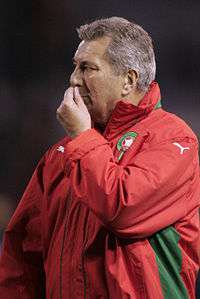
After the 2002 World Cup, former France manager Roger Lemerre took over, becoming Tunisia's fifth manager in less than two years. As well as steadying the ship, Lemerre was tasking with winning the 2004 African Cup of Nations, which Tunisia would be hosting. During the build-up to the tournament, the team established themselves as favourites with several impressive friendly results, holding France and Portugal to 1-1 draws and beating Sweden 2-1.

Tunisia advanced unbeaten from the group stage, beating Rwanda 2-1 and DR Congo 3-0, and drawing 1-1 with Guinea. The team then beat Senegal 1-0 and Nigeria on penalties to face Morocco in the final, where goals from Francileudo Santos and Ziad Jaziri gave Tunisia a 2-1 win. Lemerre became the first coach to win two different continental tournaments, having previously won Euro 2000 with France. The victory gave birth to the Tunisian team's present nickname, the "Eagles of Carthage", and accordingly, the team's badge was changed to its current design, which incorporates an eagle.
African Cup of Nations win qualified them for the 2005 Confederations Cup, where they were eliminated in the group stage despite beating Australia, having already lost 2-1 to Argentina and 3-0 to hosts Germany. The following year, they failed to defend their Cup of Nations title, losing to Nigeria in the quarter-finals, but did at least qualify for a third successive World Cup. Once again, however, they could not progress from their group, drawing 2-2 with Saudi Arabia but losing 3-1 to Spain and 1-0 to Ukraine.
In the 2008 Africa Cup of Nations, the team were again knocked out in the quarter-finals, this time losing 3-2 to Cameroon. On 30 June 2008, Roger Lemerre left Tunisia after six years, the longest reign of any of the team's coaches. He was replaced by Portuguese coach Humberto Coelho.
Disappointments (2008–2014)
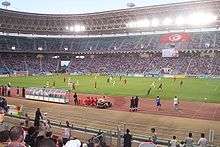
Under Coelho, Tunisia failed to qualify for the World Cup and ended the country's streak of three consecutive presences in the tournament, after losing their final qualifying match to Mozambique. Coelho was sacked immediately after this defeat and Faouzi Benzarti took over; he too was sacked after Tunisia were eliminated from the 2010 Africa Cup of Nations in the group stage, drawing all three of their matches.
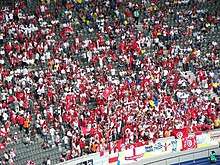
In June 2010, Bertrand Marchand was appointed manager on a two-year contract, with the goal of reaching the semifinals of the 2012 Africa Cup of Nations. However, qualification started badly, with two defeats against Botswana and a 2-2 draw against Malawi. Marchand was sacked in December, only six months into his two-year term.
The beginning of 2011 saw the Tunisian Revolution. Against this turbulent backdrop, and with little preparation under new coach Sami Trabelsi, the team surprisingly won the 2011 African Nations Championship, defeating Angola 3-0 in the final. Tunisia went on to qualify for the 2012 African Cup of Nations, but an extra-time defeat to Ghana knocked them out in the quarter-finals yet again. Tunisia fared even worse in the following tournament, falling in the group stages despite a 1-0 win over Algeria in which Youssef Msakni scored what was later voted the goal of the tournament.
In February 2013, Sami Trabelsi was replaced by Nabil Maâloul. Under Maâloul, Tunisia initially failed to make the World Cup qualification playoffs after a 2-0 defeat to Cape Verde national football team, but Cape Verde were found to have fielded an ineligible player and Tunisia were awarded a 3-0 victory, putting them through to the playoffs. With Maâloul having already resigned, Ruud Krol took over for the two-leg playoff, but Tunisia lost 4-1 to Cameroon and Krol himself then resigned.
Revival (2014–)
.jpg)
Georges Leekens was appointed coach in early 2014 to try and revive the team's fortunes. Early results were positive, including a (1-1) draw against Colombia and a 1-0 win over South Korea, both in friendly matches. Under Leekens, the team climbed from 49th to 22nd in few months in the FIFA rankings so the team regained its continental luster. Tunisia qualified for the 2015 African Cup of Nations and finished top of their group, but were eliminated in the quarter-finals after a controversial 2-1 defeat to Equatorial Guinea. In July 2015, Henryk Kasperczak returned as coach after 17 years, but was sacked after yet another quarter-final defeat at the 2017 Africa Cup of Nations, this time 2-0 against Burkina Faso despite the good start in the World Cup qualification. On 27 April 2017, Nabil Maâloul returned as coach and succeeded in bringing his team back to the 2018 FIFA World Cup for the first time since 2006. Tunisia's qualification for the 2018 FIFA World Cup and its positive results in the friendlies against Iran and Costa Rica led to its rise to 14th place in the FIFA World Rankings for the first time ever, after being first in African teams and surpassing teams like Italy and Netherlands. In the World Cup, the team was eliminated from the group stage after losing 2-1 against England and 5-2 against Belgium, before winning the last game 2-1 against Panama, the first World Cup win for Tunisia since beating Mexico 3-1 in 1978.
Home stadium
.jpg)
After the independence of Tunisia in 1956, the Tunisian national stadium was Stade Chedly Zouiten which has a capacity of 18,000 and hosted all the matches of the Tunisian team, it hosted also the 1965, 1994 African Cup of Nations and the 1977 FIFA World Youth Championship before it was replaced after the construction of Stade El Menzah (45,000) in 1967 for the 1967 Mediterranean Games. Tunisia's first match at the stadium was played on 8 September 1967 against Libya. Tunisia won the match 3–0. This stadium became the new stronghold of the Eagles of Carthage. It hosted the 1977 FIFA World Youth Championship and was completely renovated for the 1994 African Cup of Nations. It hosted also the 2004 Africa Cup of Nations. In 2001, the Stade Olympique de Radès was inaugurated as Tunisia's national stadium ahead of the 2001 Mediterranean Games. Located in Radès, the stadium has an all-seater capacity of 60,000. The first match at the stadium was played on 7 July 2001 against between ES Sahel and CS Hammam-Lif for the Tunisian Cup final. CS Hammam-Lif won the match 1–0, with Anis Ben Chouikha scoring the lone goal. Since that match, Tunisia has used the stadium for almost every major home game, including the 2004 African Cup final. The Tunisians often hosts their matches in Stade Mustapha Ben Jannet in Monastir which has a capacity of 20,000 for its excellent ground, whether in the African Cup of Nations qualification, World Cup qualification or friendly matches.
Competition records
World Cup record
| FIFA World Cup record | FIFA World Cup Qualification record | |||||||||||||||
|---|---|---|---|---|---|---|---|---|---|---|---|---|---|---|---|---|
| Year | Round | Position | Pld | W | D* | L | GF | GA | Pld | W | D | L | GF | GA | ||
| Part of |
Part of | |||||||||||||||
| Did not enter | Did not enter | |||||||||||||||
| Did not qualify | 3 | 1 | 1 | 1 | 4 | 4 | ||||||||||
| Withdrew | Withdrew | |||||||||||||||
| Did not qualify | 5 | 1 | 4 | 0 | 4 | 3 | ||||||||||
| 4 | 1 | 1 | 2 | 5 | 5 | |||||||||||
| Group stage | 9th | 3 | 1 | 1 | 1 | 3 | 2 | 10 | 4 | 4 | 2 | 15 | 9 | |||
| Did not qualify | 2 | 1 | 0 | 1 | 2 | 2 | ||||||||||
| 8 | 4 | 0 | 4 | 11 | 9 | |||||||||||
| 10 | 4 | 1 | 5 | 10 | 11 | |||||||||||
| 6 | 3 | 3 | 0 | 14 | 2 | |||||||||||
| Group stage | 26th | 3 | 0 | 1 | 2 | 1 | 4 | 8 | 7 | 1 | 0 | 15 | 2 | |||
| Group stage | 29th | 3 | 0 | 1 | 2 | 1 | 5 | 10 | 8 | 2 | 0 | 28 | 5 | |||
| Group stage | 24th | 3 | 0 | 1 | 2 | 3 | 6 | 10 | 6 | 3 | 1 | 25 | 9 | |||
| Did not qualify | 12 | 7 | 3 | 2 | 18 | 7 | ||||||||||
| 8 | 4 | 3 | 1 | 14 | 10 | |||||||||||
| Group stage | 24th | 3 | 1 | 0 | 2 | 5 | 8 | 8 | 6 | 2 | 0 | 15 | 6 | |||
| To be determined | ||||||||||||||||
| To be determined | ||||||||||||||||
| Total | Group stage | 5/21 | 15 | 2 | 4 | 9 | 13 | 25 | 104 | 57 | 28 | 19 | 180 | 84 | ||
FIFA Confederations Cup
| FIFA Confederations Cup record | |||||||||
|---|---|---|---|---|---|---|---|---|---|
| Appearances : 1 | |||||||||
| Year | Round | Position | Pld | W | D | L | GF | GA | Squad |
| Did not qualify | |||||||||
| Group stage | 6th | 3 | 1 | 0 | 2 | 3 | 5 | Squad | |
| Did not qualify | |||||||||
| Total | Group stage | 1/10 | 3 | 1 | 0 | 2 | 3 | 5 | – |
Africa Cup of Nations record
| Africa Cup of Nations record | |||||||||
|---|---|---|---|---|---|---|---|---|---|
| Appearances : 18 | |||||||||
| Year | Round | Position | Pld | W | D | L | GF | GA | |
| Did not enter | |||||||||
| Third place | 3rd | 2 | 1 | 0 | 1 | 5 | 4 | ||
| Group stage | 5th | 2 | 0 | 1 | 1 | 3 | 5 | ||
| Runners-up | 2nd | 3 | 1 | 1 | 1 | 6 | 3 | ||
| Did not qualify | |||||||||
| Did not enter | |||||||||
| Did not qualify | |||||||||
| Fourth place | 4th | 5 | 1 | 3 | 1 | 5 | 4 | ||
| Withdrew | |||||||||
| Group stage | 7th | 3 | 0 | 1 | 2 | 1 | 4 | ||
| Did not qualify | |||||||||
| Group stage | 9th | 2 | 0 | 1 | 1 | 1 | 3 | ||
| Runners-up | 2nd | 6 | 2 | 2 | 2 | 10 | 9 | ||
| Quarter-finals | 5th | 4 | 2 | 1 | 1 | 6 | 5 | ||
| Fourth place | 4th | 6 | 2 | 2 | 2 | 6 | 9 | ||
| Group stage | 11th | 3 | 0 | 2 | 1 | 0 | 1 | ||
| Champions | 1st | 6 | 4 | 2 | 0 | 10 | 4 | ||
| Quarter-finals | 6th | 4 | 2 | 1 | 1 | 7 | 5 | ||
| Quarter-finals | 5th | 4 | 1 | 2 | 1 | 7 | 6 | ||
| Group stage | 12th | 3 | 0 | 3 | 0 | 3 | 3 | ||
| Quarter-finals | 6th | 4 | 2 | 0 | 2 | 5 | 5 | ||
| Group stage | 12th | 3 | 1 | 1 | 1 | 2 | 4 | ||
| Quarter-finals | 7th | 4 | 1 | 2 | 1 | 5 | 5 | ||
| Quarter-finals | 8th | 4 | 2 | 0 | 2 | 6 | 7 | ||
| To be determined | |||||||||
| Total | 1 Title | 18/31 | 68 | 22 | 25 | 21 | 88 | 86 | |
African Nations Championship record
| African Nations Championship | ||||||||
|---|---|---|---|---|---|---|---|---|
| Appearances: 2 | ||||||||
| Year | Round | Position | Pld | W | D | L | GF | GA |
| Did not qualify | ||||||||
| Champions | 1 | 6 | 4 | 2 | 0 | 11 | 3 | |
| Did not qualify | ||||||||
| Quarter-finals | 8th | 4 | 1 | 2 | 1 | 9 | 5 | |
| Did not compete | ||||||||
| To be determined | ||||||||
| Total | Champion | 1/2 | 10 | 5 | 4 | 1 | 20 | 8 |
Arab Nations Cup record
| Arab Nations Cup | ||||||||
|---|---|---|---|---|---|---|---|---|
| Appearances: 2 | ||||||||
| Year | Round | Position | Pld | W | D | L | GF | GA |
| Champions | 1st | 4 | 4 | 0 | 0 | 11 | 1 | |
| Did not enter | ||||||||
| Group Stage | 7th | 4 | 0 | 3 | 1 | 3 | 4 | |
| Did not enter | ||||||||
| Total | Champions | 2/9 | 8 | 4 | 3 | 1 | 14 | 5 |
Honours
- This is a list of honours for the senior Tunisia national team
African Competitions

Arabic Competitions



Mediterranean Competitions
Coaching staff
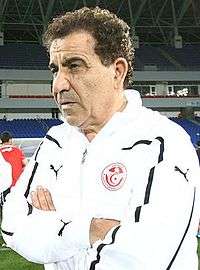
| Position | Name |
|---|---|
| Head Coach | |
| Assistant Coach | |
| Goalkeeping Coach | |
| Fitness Coach | |
| Technical Advisor | |
| Team Doctor | |
Managers
| Nationality | Name | Period | Matches | Won | Drawn | Lost | Win% | Achievements |
|---|---|---|---|---|---|---|---|---|
| Rachid Turki | 1956–1957 | 2 | 2 | 0 | 0 | 100.00% | ||
| Hechmi Cherif Larbi Soudani Habib Draoua |
1957–1960 | 15 | 7 | 2 | 6 | 46.67% | ||
| Milan Kristić | 1960–1961 | 23 | 5 | 4 | 14 | 21.74% | Qualification to 1960 Summer Olympics | |
| Frane Matošić | 1961–1962 | 6 | 1 | 2 | 3 | 16.67% | ||
| André Gérard | 1963–1965 | 34 | 15 | 9 | 10 | 44.12% | ||
| Mokhtar Ben Nacef | 1965–1968 | 15 | 5 | 8 | 2 | 33.33% | ||
| Radojica Radojičić | 1968–1970 | 9 | 2 | 3 | 4 | 22.22% | ||
| Sereta Begovic | 1969 | 5 | 0 | 4 | 1 | 0.00% | ||
| Ameur Hizem | 1970–1974 | 33 | 16 | 6 | 11 | 48.48% | ||
| André Nagy | 1974–1975 | 10 | 4 | 1 | 5 | 40.00% | ||
| Abdelmajid Chetali | 1975–1978 | 52 | 18 | 18 | 16 | 34.61% | 1978 African Cup of Nations Fourth Place Qualification to 1978 FIFA World Cup | |
| Ameur Hizem | 1978–1979 | 3 | 1 | 1 | 1 | 33.33% | ||
| Hmid Dhib | 1979–1980 | 14 | 3 | 3 | 5 | 21.43% | ||
| Ryszard Kulesza | 1981–1983 | 25 | 10 | 5 | 10 | 40.00% | ||
| Youssef Zouaoui | 1984–1986 | 26 | 13 | 3 | 8 | 54.16% | ||
| Jean Vincent | 1986–1987 | 10 | 1 | 2 | 7 | 10.00% | ||
| Taoufik Ben Othman | 1987–1988 | 16 | 4 | 3 | 9 | 25.00% | Qualification to 1988 Summer Olympics | |
| Antoni Piechniczek | 1988 | 9 | 3 | 3 | 3 | 33.33% | ||
| Mokhtar Tlili | 1988–1989 | 14 | 3 | 4 | 7 | 21.43% | ||
| Antoni Piechniczek | 1989 | 8 | 2 | 2 | 4 | 25.00% | ||
| Mrad Mahjoub | 1990–1993 | 26 | 8 | 13 | 5 | 30.77% | ||
| Youssef Zouaoui | 1993-1994 | 13 | 4 | 6 | 3 | 30.77% | ||
| Henryk Kasperczak | 1994–1998 | 59 | 30 | 11 | 18 | 50.84% | Qualification to 1996 Summer Olympics Qualification to 1998 FIFA World Cup | |
| Francesco Scoglio | 1998–2001 | 32 | 19 | 8 | 5 | 59.73% | 2000 African Cup of Nations Fourth Place | |
| Eckhard Krautzun | 2001 | 7 | 4 | 2 | 1 | 57.14% | Qualification to 2002 FIFA World Cup | |
| Henri Michel | 2001–2002 | 6 | 2 | 2 | 2 | 33.33% | ||
| Ammar Souayah | 2002 | 6 | 0 | 3 | 3 | 0.00% | ||
| Roger Lemerre | 2002–2008 | 67 | 40 | 15 | 12 | 59.70% | Qualification to 2004 Summer Olympics Qualification to 2005 FIFA Confederations Cup Qualification to 2006 FIFA World Cup | |
| Humberto Coelho | 2008–2009 | 15 | 5 | 4 | 3 | 33.33% | ||
| Faouzi Benzarti | 2009–2010 | 4 | 0 | 3 | 1 | 0.00% | ||
| Bertrand Marchand | 2010 | 6 | 3 | 1 | 2 | 50.00% | ||
| Sami Trabelsi | 2010–2013 | 32 | 13 | 9 | 10 | 40.63% | ||
| Nabil Maâloul | 2013 | 7 | 2 | 3 | 2 | 28.57% | ||
| Ruud Krol | 2013 | 2 | 0 | 1 | 1 | 0.00% | ||
| Georges Leekens | 2014–2015 | 19 | 7 | 8 | 4 | 36.84% | ||
| Henryk Kasperczak | 2015–2017 | 26 | 12 | 5 | 10 | 46.15% | ||
| Nabil Maâloul | 2017–2018 | 13 | 6 | 4 | 3 | 46.15% | Qualification to 2018 FIFA World Cup | |
| Faouzi Benzarti | 2018– | 2 | 2 | 0 | 0 | 100.00% |
Recent results and forthcoming fixtures
This is a list of matches from the last twelve months and any future scheduled matches.
2017
| 1 September 2017 2018 WCQ | Tunisia | 2–1 | Radès, Tunisia | |
| 21:00 CET | Report |
|
Stadium: Stade Olympique de Radès Attendance: 50,000 Referee: Eric Otogo-Castane (Gabon) |
| 5 September 2017 2018 WCQ | DR Congo | 2–2 | Kinshasa, DR Congo | |
| 18:30 CET | Report | Stadium: Stade des Martyrs Attendance: 80,000 Referee: Daniel Bennett (South Africa) |
| 7 October 2017 2018 WCQ | Guinea | 1–4 | Conakry, Guinea | |
| 17:00 GMT |
|
Report | Stadium: Stade du 28 Septembre Attendance: 12,000 Referee: Janny Sikazwe (Zambia) |
| 11 November 2017 2018 WCQ | Tunisia | 0–0 | Radès, Tunisia | |
| 18:30 CET | Report | Stadium: Stade Olympique de Radès Attendance: 60,000 Referee: Hamada Nampiandraza (Madagascar) |
2018
| 23 March 2018 Friendly | Tunisia | 1–0 | Radès, Tunisia | |
| 19:15 CET | Mohammadi |
Report | Stadium: Stade Olympique de Radès Attendance: 5,000 Referee: Ibrahim Nour El Din (Egypt) |
| 27 March 2018 Friendly | Tunisia | 1–0 | Nice, France | |
| 19:00 CEST | Khazri |
Report | Stadium: Allianz Riviera Attendance: 7,000 Referee: Frank Schneider (France) |
| 28 May 2018 Friendly | Portugal | 2–2 | Braga, Portugal | |
| 19:45 WEST | A. Silva João Mário |
Report | Badri Ben Youssef |
Stadium: Estádio Municipal de Braga Attendance: 17,220 Referee: Luca Banti (Italy) |
| 1 June 2018 Friendly | Tunisia | 2–2 | Geneva, Switzerland | |
| 20:15 CEST | Badri Sassi |
Report | Tosun Söyüncü |
Stadium: Stade de Genève Attendance: 12,000 Referee: Fedayi San (Switzerland) |
| 9 June 2018 Friendly | Tunisia | 0–1 | Krasnodar, Russia | |
| 21:45 MSK | Report | Aspas |
Stadium: Krasnodar Stadium Attendance: 33,116 Referee: Bas Nijhuis (Netherlands) |
| 18 June 2018 2018 World Cup GS | Tunisia | 1–2 | Volgograd, Russia | |
| 21:00 MSK | Sassi |
Report | Kane |
Stadium: Volgograd Arena Attendance: 41,064 Referee: Wilmar Roldán (Colombia) |
| 23 June 2018 2018 World Cup GS | Belgium | 5–2 | Moscow, Russia | |
| 15:00 MSK | E. Hazard R. Lukaku Batshuayi |
Report | Bronn Khazri |
Stadium: Otkrytiye Arena Referee: Jair Marrufo (United States) |
| 28 June 2018 2018 World Cup GS | Panama | 1–2 | Saransk, Russia | |
| 21:00 MSK | Meriah |
Report | F. Ben Youssef Khazri |
Stadium: Mordovia Arena Attendance: 37,168 Referee: Nawaf Shukralla (Bahrain) |
| 9 September 2018 2019 AFCONQ | Swaziland | 0–2 | Manzini, Swaziland | |
| 15:00 SAST | Report | Khenissi N. Sliti |
Stadium: Mavuso Sports Centre Referee: Bamlak Tessema Weyesa (Ethiopia) |
| 13 October 2018 2019 AFCONQ | Tunisia | 1–0 | Radès, Tunisia | |
| 19:15 CET | Meriah |
Report | Stadium: Stade Olympique de Radès Referee: Eric Otogo-Castane (Gabon) |
| 16 October 2018 2019 AFCONQ | Niger | v | Niamey, Niger | |
| 16:00 WAT | Report | Stadium: Stade Général Seyni Kountché Referee: Noureddine El Jaafari (Morocco) |
| 16 November 2018 2019 AFCONQ | Egypt | v | Egypt | |
| Report |
2019
| 22 March 2019 2019 AFCONQ | Tunisia | v | Tunisia | |
| Report |
Players
Current squad
The following 23 players were called up for the 2019 Africa Cup of Nations qualification match against Niger in October 2018.
Caps and goals updated as 13 October 2018 after the match against Niger. Only official FIFA matches are included.
| No. | Pos. | Player | Date of birth (age) | Caps | Goals | Club |
|---|---|---|---|---|---|---|
| 1 | GK | Farouk Ben Mustapha (Captain) | 1 July 1989 | 18 | 0 | |
| 16 | GK | Moez Ben Cherifia | 24 June 1991 | 17 | 0 | |
| GK | Makrem Bdiri | 9 January 1991 | 0 | 0 | ||
| 2 | DF | Syam Ben Youssef (Vice captain) | 31 March 1989 | 45 | 1 | |
| 3 | DF | Hamdi Nagguez | 28 October 1992 | 20 | 0 | |
| 4 | DF | Yassine Meriah | 2 July 1993 | 22 | 2 | |
| 5 | DF | Oussama Haddadi | 28 January 1992 | 11 | 0 | |
| 6 | DF | Rami Bedoui | 19 January 1990 | 10 | 0 | |
| 12 | DF | Ayman Ben Mohamed | 8 December 1994 | 0 | 0 | |
| DF | Hamza Mathlouthi | 25 July 1992 | 4 | 0 | ||
| DF | Dylan Bronn | 19 June 1995 | 8 | 1 | ||
| 7 | MF | Naïm Sliti | 27 July 1992 | 24 | 3 | |
| 10 | MF | Firas Belarbi | 27 May 1996 | 0 | 0 | |
| 14 | MF | Mohamed Amine Ben Amor | 1 January 1992 | 28 | 2 | |
| 15 | MF | Ghailene Chaalali | 28 February 1994 | 10 | 0 | |
| 17 | MF | Ellyes Skhiri | 10 May 1995 | 10 | 0 | |
| 18 | MF | Bassem Srarfi | 25 June 1997 | 8 | 0 | |
| MF | Saîf-Eddine Khaoui | 27 April 1995 | 0 | 0 | ||
| MF | Ahmed Khalil | 21 December 1994 | 4 | 0 | ||
| 8 | FW | Fakhreddine Ben Youssef | 21 June 1991 | 44 | 6 | |
| 9 | FW | Firas Chaouat | 8 May 1996 | 0 | 0 | |
| 11 | FW | Taha Yassine Khenissi | 6 January 1992 | 22 | 5 | |
| 13 | FW | Jassem Hamdouni | 17 December 1996 | 0 | 0 | |
Recent call-ups
The following players have been called up to the squad within the last 12 months.
| Pos. | Player | Date of birth (age) | Caps | Goals | Club | Latest call-up |
|---|---|---|---|---|---|---|
| GK | Aymen Mathlouthi | 14 September 1984 | 66 | 0 | 2018 FIFA World Cup | |
| GK | Mouez Hassen | 5 March 1995 | 4 | 0 | 2018 FIFA World Cup | |
| DF | Ali Maâloul | 1 January 1990 | 49 | 0 | v. | |
| DF | Yohan Benalouane | 28 March 1987 | 5 | 0 | 2018 FIFA World Cup | |
| MF | Karim Laribi | 20 April 1991 | 2 | 0 | 2018 FIFA World Cup PRE | |
| MF | Mohamed Larbi | 2 September 1987 | 4 | 0 | v. | |
| MF | Karim Aouadhi | 2 May 1986 | 9 | 1 | v. | |
| MF | Ghazi Ayadi | 19 July 1996 | 1 | 0 | v. | |
| MF | Mohamed Ali Moncer | 28 April 1991 | 17 | 3 | v. | |
| MF | Ferjani Sassi | 18 March 1992 | 43 | 4 | 2018 FIFA World Cup | |
| FW | Ahmed Akaïchi | 23 February 1989 | 29 | 9 | v. | |
| FW | Wahbi Khazri INJ | 8 February 1991 | 38 | 14 | v. | |
| FW | Issam Jebali INJ | 25 December 1991 | 1 | 0 | v. | |
| FW | Alaeddine Marzouki | 3 January 1990 | 0 | 0 | v. | |
INJ Player withdrew from the squad due to an injury. | ||||||
Records
Most capped players

| # | Player | Caps | Goals | Career |
|---|---|---|---|---|
| 1 | Sadok Sassi | 116 | 0 | 1963–1978 |
| 2 | Radhi Jaïdi | 105 | 7 | 1996–2009 |
| 3 | Khaled Badra | 97 | 12 | 1995–2006 |
| 4 | Khaled Ben Yahia | 95 | 5 | 1979–1993 |
| Kaies Ghodhbane | 95 | 6 | 1995–2006 | |
| 6 | Chokri El Ouaer | 93 | 0 | 1993–2002 |
| 7 | Riadh Bouazizi | 92 | 3 | 1995–2006 |
| 8 | Tarak Dhiab | 89 | 12 | 1974–1990 |
| 9 | Mohamed Ali Mahjoubi | 86 | 17 | 1985–1995 |
| Sirajeddine Chihi | 86 | 4 | 1991–2001 |
Players in bold are still active.
Top goalscorers
| # | Player | Goals | Caps | Career |
|---|---|---|---|---|
| 1 | Issam Jemâa | 36 | 83 | 2005–2014 |
| 2 | Francileudo Santos | 21 | 41 | 2004–2008 |
| 3 | Adel Sellimi | 20 | 78 | 1991–2002 |
| 4 | Faouzi Rouissi | 18 | 57 | 1989–2001 |
| 5 | Mohamed Ali Mahjoubi | 17 | 86 | 1985–1995 |
| 6 | Zoubeir Baya | 16 | 83 | 1994–2002 |
| 7 | Mohamed Salah Jedidi | 15 | 32 | 1962–1965 |
| Ziad Jaziri | 15 | 63 | 1999–2007 | |
| 9 | Wahbi Khazri | 14 | 39 | 2013– |
| Mohieddine Habita | 14 | 25 | 1972–1980 | |
| Hassen Gabsi | 14 | 50 | 1997–2002 |
Players in bold are still active.
Historic kits
Kit providers
| Name | Start | End |
|---|---|---|
| 1970's | 1992 | |
| 1994 | 1998 | |
| 2000 | 2001 | |
| 2002 | 2010 | |
| 2010 | 2016 | |
| 2016 | present |
See also
- Tunisian Football Federation
- Tunisia A' national football team
- Tunisia national under-23 football team
- Tunisia national under-20 football team
- Tunisia national under-17 football team
- Tunisia national under-15 football team
- Tunisia women's national football team
- Tunisia women's national under-20 football team
- Tunisia women's national under-17 football team
Other football codes
References
- 1 2 Imed Kilani. "Tunisia – Record International Players". RSSSF. Retrieved 16 August 2013.
External links
| Wikimedia Commons has media related to Tunisia national football team. |